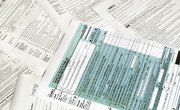Going into business for yourself has its advantages. For one, the profit belongs to you and you alone. On the flip side, however, the losses are all yours, too. Self-employed people must report both profits and losses on their tax returns, and the Internal Revenue Service has forms just for this purpose.
Tips
A self-employment net loss must be reported on IRS Form 1040, along with Schedule C and Schedule SE.
Income Tax Return for the Self Employed
Self-employed people report profits and losses from their businesses by filing Schedule C with their tax returns. You must use Form 1040 for your tax return. Self-employed people cannot file the 1040A "short form" or the bare-bones Form 1040EZ. You use Schedule C to calculate the amount of your profit or loss, then transfer that amount to your 1040. (There is an abbreviated version of Schedule C, known as Schedule C-EZ, but you cannot use it to report a loss.) Self-employed people must also file the IRS form Schedule SE with their tax return. This is the form used to compute "self-employment tax," which is what the IRS calls Social Security and Medicare taxes for the self-employed.
On Part I of Schedule C, you compute your gross income from self-employment. On Part II, you list your expenses. You then subtract expenses from income. When your expenses exceed your gross income, you incur a net loss for the year. The amount of your loss goes on Line 12 of Form 1040. When you have a net loss from your business, you won't have to pay self-employment tax, since that tax is assessed only on profits. Even so, if you're filing Schedule C, you still must file Schedule SE. One wrinkle: You can't claim a loss greater than your own investment in the business; if your reported loss exceeds that amount, you may have to file Form 6198 to calculate your allowable loss. This doesn't apply to the vast majority of self-employed people, though.
You can use net losses from self-employment to offset other income on your return, which may reduce the tax you owe. For example, say you had a "regular" job that paid you $5,000 during the year. You also ran a lawn-mowing business that operated at a net loss of $700. Your gross income for the year is just $4,300 – that's $5,000 from the job minus your $700 loss. If your loss exceeds all your other income for the year, you may have what the IRS calls a "net operating loss."
These losses can be carried into other years to offset income in those years. This is called a self employment tax loss carryover In general, losses can be carried back up to two years (by filing amended returns) or carried forward up to 20 years.
Exceptions for Hobbies
If you're going to claim a net loss from self-employment, be aware that the IRS might take a close look to make sure you're actually running a business. It's not uncommon for taxpayers to try to pass off a money-losing hobby as a business to claim a loss and reduce their taxes. If you've had a profit in three of the past five years, the IRS automatically considers it a business. Otherwise, the IRS will look at how you operate. There's no hard-and-fast rule about what qualifies an activity as a business, but the IRS considers such factors as whether you depend on the activity for income, whether the time and effort you put into the activity suggest you're trying to make a profit, and whether you've altered the way you operate to try to boost profitability.
2018 Tax Law Changes
One big change for self-employed people in 2018 is a new 20 percent deduction for income from passthrough businesses, which include sole proprietorships and partnerships. You may be able to save substantially on your taxes if you made money from your small business, but this won't help you if you lost money.
Additionally, tax rates are generally decreasing for 2018, meaning you may save money on taxes for any income your small business did see.
2017 Tax Law
As of 2017, that passthrough income deduction is not available, and tax rates are generally higher than they will be for tax year 2018.
References
Writer Bio
Cam Merritt is a writer and editor specializing in business, personal finance and home design. He has contributed to USA Today, The Des Moines Register and Better Homes and Gardens"publications. Merritt has a journalism degree from Drake University and is pursuing an MBA from the University of Iowa.

